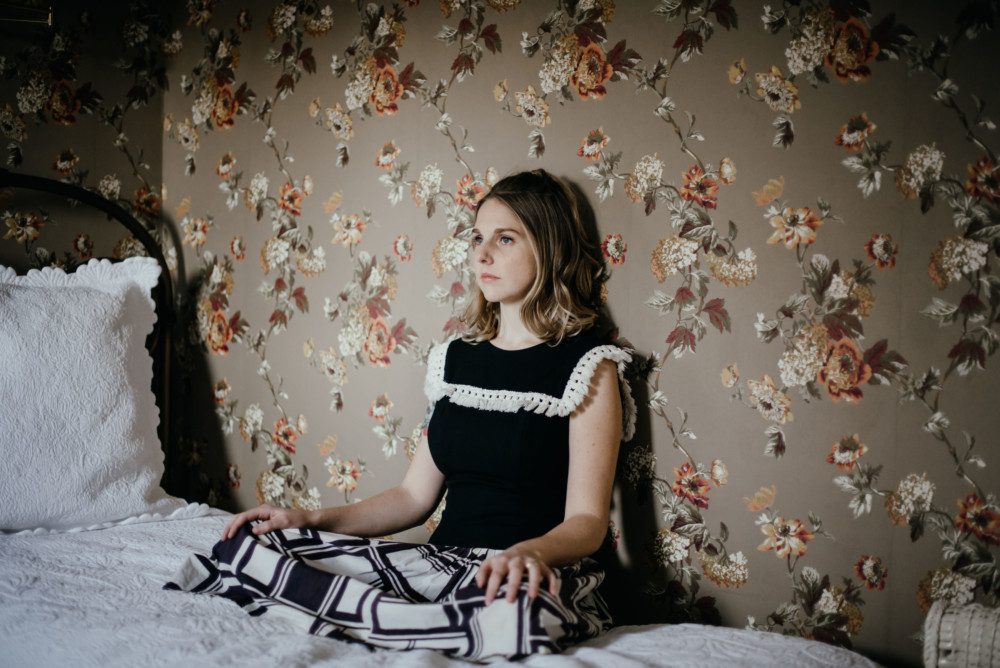PREMIERE: On “I’ll Be Home” Dori Freeman Balances Music and Motherhood


When Dori Freeman broke out in 2016, it felt as if the whole world was hanging on her heart-wrenching voice and vulnerable storytelling. Three years and three albums later, Freeman’s work still has that power, and yet she’s replaced heartbreak with the buoyancy of a happy marriage (to her drummer, Nick Falk) and raising her daughter. Still, happiness can introduce its own challenges for songwriting, and her new album, Every Little Star, out Friday, traverses that ground with grace and curiosity.
The listener is along for a wistful ride with “I’ll Be Home.” Freeman writes and sings the song from a place of internal conflict, from the spot where motherhood and music compete for her attention. As it begins, Freeman is leaving home before dawn, not “daring” to kiss her daughter goodbye and wake her. As she reluctantly takes off from home to play music and make the living that “must be made on a microphone,” the guitar swells tenderly and the vocals croon bittersweet. It’s the perfect lullaby from a devoted working mother.
In conversation with Audiofemme, Freeman explores the inspiration for this Teddy Thompson-produced new single, the challenges of balancing motherhood and career, and how happiness has helped her find new ways to write on Every Little Star.
AF: Tell me about what birthed this new single, “I’ll Be Coming Home.” In the lyrics, I hear you working to balance your flourishing music career with raising your daughter. What is it like balancing your motherhood with your music, and why did you choose to write more about it on the forthcoming album?
DF: I wanted to write a song I can play on stage when I’m away working that reminds me of my daughter so I can feel like she’s part of what I’m doing. Finding a balance between motherhood and my career is difficult – like it is for any working mom. I’m home more than I gig in the grand scheme of things and I just try to give all my attention and focus to whatever role I’m in at the time, be it mother or musician. I wanted to write more about it for this record, because there aren’t enough songs about motherhood and the relationships between parents and children. People seem to really respond to them, so there’s obviously a desire to hear more songs about those parts of life.
AF: Obviously, you’ve really honed in on how to channel parts of motherhood into your creative pursuits. Quite a feat when you consider how energetically demanding motherhood can be. How have you learned, or are you learning, to balance these two parts of your life?
DF: I’m still learning how to balance the two. I’m sure I always will be. I try to be a really involved mother and also to include my daughter when circumstance allows in my work. So anytime she can travel with me and see me perform, experience new places and things – that’s great.
AF: In general, what’s your songwriting process like? I’d love to hear about it, down to the cup of tea you make or spot you sit in. Is it consistent every time?
DF: I don’t have any specific rituals or habits attached to songwriting. I tend to write at night when my family is asleep or when I have the house to myself. Usually it starts with a melody, but sometimes words come first. Then I just try to build off of what I have and see if it starts to turn into a song. I can usually tell pretty quickly if a song is worth finishing. I typically write from experience, but occasionally imagine characters and stories or glean ideas from the stories of friends and family.
AF: Tell me about the new album, Every Little Star. What are some through lines or themes that were the original kernels of inspiration for it? What has been the most challenging, and the most rewarding parts of seeing it come to fruition?
DF: I’d say it’s the most optimistic album I’ve made. I’m in a much different place emotionally then I was when I made my first record. I’m happily married now for one, and writing songs when you’re happy can be ironically challenging. I wanted to write about motherhood and try to tell some stories that weren’t from my own personal experience. A friend shared a story about a relationship she thought would make a good song, I wrote a cowboy (girl) song. This record is a good balance of autobiographical material about love and motherhood and imagined storytelling.
AF: In 2016, your break-out album blew everyone away, particularly because of the poignancy, strength, and clarity of your voice. When did you start to sing, and why? I know you come from a musical family —how did that look day to day?
DF: I’ve been singing since I was little. I’d sing along with whatever my mom and dad played in the car and joined choir when I was 11. I also grew up with a musical family and saw my dad and grandpa perform a lot. As I got older I started performing songs with them here and there and eventually decided it was what I wanted to do professionally. I’ve also been fortunate to work on a project with my grandpa, recording the songs he’s written over his 87 years. That was a very dear experience for me. The project is called At Home In the Blue Ridge.
AF: Your breakout album had an edge of being wronged and heartbroken, and it gave your music a certain weight that was undeniable. Now, you seem much happier, and still the music still has that weight, or draw, that makes you go, “This is really good.” I mention this because many artists find happy times to be some of the most challenging for inspiration, because darker emotions had always been their fuel before. Do you find this to be the case? It seems you have found ways to mine your life, no matter what’s happening, for great songs—how do you do it?
DF: It’s much more challenging to write songs when you’re happy. It’s a trade off. I’ve had to work at it, but I think I’ve found ways to write songs that aren’t about personal heartbreak that are still good songs. Writing about motherhood has been a wonderful experience. Imagining characters is also fun.
AF: Give me a little context on your history with Teddy Thompson and, if applicable, the rest of the Thompson family (I love love loved your cover of “Bright Lights” on the last album, by the way!)? How did you two meet, and what has he brought to your music and career?
DF: We met through Facebook. I sent him a message in 2014 of me covering one of his songs and told him I wanted to work with him somehow. He actually responded and eventually he offered to produce a record for me. Now we’ve made three albums together and it’s been such a wonderful experience working with him. He opened a lot of doors for me and he’ll always be a dear friend.
AF: Will you tour with the new album?
DF: For now, I have some dates in October. Oct. 13th at Richmond Folk Fest with my grandpa; Oct. 17 at Cock N Bull, Galway, NY; Oct. 18th at Town and City Festival, Lowell, Mass; Oct. 19th at Frinklepod Farm, Arundel, ME. I’ll probably add a few more for the end of this year and will tour more in 2020.
Follow Dori Freeman on Facebook for ongoing updates.



